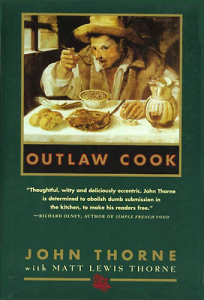I wanted to check in and remind everyone that the deadline for posting about our current Cook the Books selection, Outlaw Cook by John and Matt Lewis Thorne is January 23, 2012. I hope everyone is savoring this wonderful book as much I has have. As I was reading and re-reading it I found that I was bookmarking a lot of quotations for later reflection. Here’s a few that caught my attention:
While researching and experimenting with the various ingredients of a classic plowman’s lunch (bread, cheese, onion, brew), Thorne notes:
“One of the differences between the universe of cooking as portrayed in beginner’s cookbooks and as we acquire it in real life is that the former knowledge progresses in an orderly fashion, while in real life it arrives in unique chunks of experience…and in no particular order. In this regard, it is more like doing a jigsaw puzzle: putting your hand on just the right piece can link several other unconnected-seeming pieces together into a coherent pattern.” (pp. 38-39)
That’s how I experienced learning how to cook. I had read a lot of cookbooks and jotted down a bunch of recipes when I was a teenager, but didn’t really translate all that theoretical knowledge into reliably delicious, or even edible, meals until I had to cook my own meals as a young adult.
Here’s another Thorne-y passage that really resonated with me. Thorne notes that he does not consider himself to be a good cook, as defined by being able to whip out a range of complicated dishes with great skill. However, he does not consider himself to be the opposite of a good cook, or a “capon”:
“…one of those armchair appetites who lovingly detail dishes they’ve conned their wives into confecting)…Why do I write about food at all if I’m not an expert in the art of good cooking, nor do I want my readers to be? Because I think you don’t have to be a good cook, or even aspire to be one, to be an interested cook.” (p. 78)
Exactly.
In a wonderful essay on cooking with microwave ovens and food processors, “Cuisine Mecanique”, Thorne again grabbed me by the lapels with this bit of writing:
“Imagine wanting to take a whole afternoon to leisurely prepare supper–without food processor, microwave oven, or cookbook. To live, after all, is to experience things, and every time we mince an onion, lower the flame under a simmering pot, shape the idea and substance of a meal, we actually gain rather than lose lived time. Such minutes are not only full and rich in themselves, but they brush a lasting patina of lived experience onto our memory” (p. 353)
Such thoughtful prose has really made this book such a pleasure for me and I have been waiting to share this new-found favorite author with you all. I’m looking forward to your posts and I’m sure our Guest Judge, John Thorne, will be too.
Do you have any favorite passages from this book?


No comments:
Post a Comment